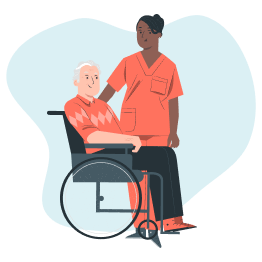FAQ
Freequently Asked
Questions
Do you have questions on how hospice works, who provides care, or who pays for it? We have answers for all of that and more!
Anyone with a serious illness who doctors think has a short time to live - generally 6 months or less -usually qualifies for hospice care. For Medicare to pay for hospice care, patients must stop medical treatment intended to cure or control their illness.
Despite the benefits of using hospice care, many people wait to receive hospice care until the final weeks or days of life. It’s important to talk with your doctor about your illness and how your disease is progressing. Starting hospice early may be able to provide months of meaningful care and quality time with loved ones.
Hospice care can provide a range of different services depending on your symptoms and end of life care wishes. These services include, but are not limited to, emotional and spiritual support for the person and their family, relief of symptoms and pain, help with advance care planning, therapy services, like physical or occupational therapy, and much more.
Most Medicaid, Medicare, and private insurance providers will cover some of the services provided by hospice. Older adults enrolled in Medicare can receive hospice care if their healthcare provider thinks they have 6 months or less to live. In most cases, they will need to sign a statement choosing hospice care instead of other Medicare-covered treatments for their illness.
While some may think hospice provides 24 hours a day, 7 days a week custodial care, or full-time care at home or an outside facility, this is rarely the case. Although hospice provides a lot of support, most of the day-to-day care of a person dying is provided by family and friends. However, a person from a hospice care team is usually always available by phone 24/7.
Most people with advanced dementia cannot communicate clearly, which means they may not be able to share their concerns with their caregivers. Caregivers may find it difficult to provide adequate care at the end of life because of this and other concerns. Hospice care can help with this situation. Hospice - whether used at home or in a medical facility - can provide caregivers and the person with dementia the support they may need near the end of life. Studies show that family members of people with dementia who received hospice report better quality of care and having more of their needs met at the end of life.
Studies have shown that when a person enrolls in hospice care they are more likely to have increased family satisfaction and better symptom and pain management. They are also less likely to undergo tests or be given medication they don’t need or want.











